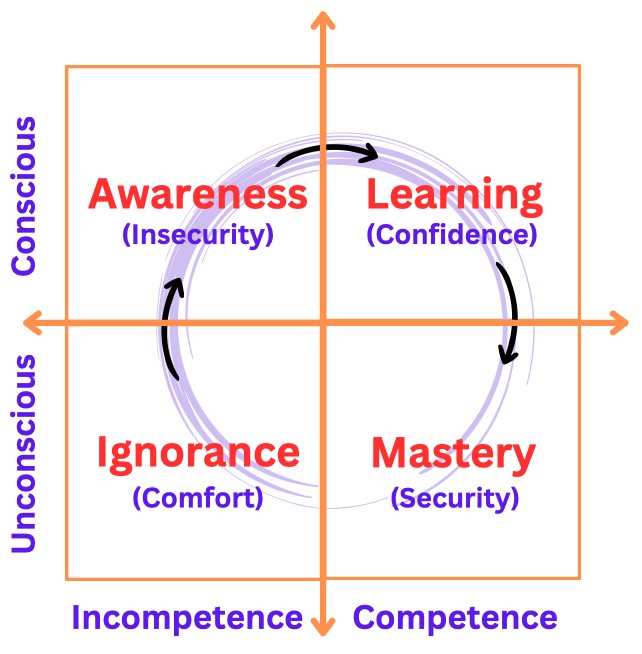As humans, we are perpetual learners, constantly evolving and adapting to the world around us. Whether we’re consciously aware of it or not, we are always absorbing new information and refining our skills. However, the journey of learning isn’t always linear, and some approaches are more effective than others. True growth comes not just from acquiring knowledge, but from applying it, practicing it, and integrating it into our everyday actions. Understanding the 4 Stages Of Learning, a model that provides valuable insights into this process, can significantly enhance our personal and professional development.
The 4 Stages of Learning: A Framework for Skill Development
The 4 stages of learning, also known as the four stages of competence, offer a framework to understand how we progress from novice to expert in any skill. While the origin of this model is debated, with some attributing it to Abraham Maslow and others to Noel Burch, evidence suggests Martin M. Broadwell first articulated it in 1969. Regardless of its precise origin, this model remains profoundly relevant because it clearly maps out the typical learning journey. Modern neuroscience supports its validity, showing how our brains forge new neural pathways as we move through these stages. Recognizing these stages and cultivating self-awareness can significantly optimize our learning process.
Learners navigating skill acquisition will typically find themselves in one of these 4 stages of learning: unconscious incompetence, conscious incompetence, conscious competence, and unconscious competence.
 The Four Stages of Learning Model Diagram
The Four Stages of Learning Model Diagram
Stage 1: Unconscious Incompetence
The first of the 4 stages of learning is unconscious incompetence. In this initial phase, individuals are blissfully unaware of their lack of skill or knowledge in a particular area. They don’t know what they don’t know. For instance, someone might be completely unaware of the complexities of driving a car, perhaps believing it’s simply a matter of turning the steering wheel. This lack of awareness can breed complacency and hinder the motivation to learn and improve. The crucial step to move beyond this stage is recognizing that a skill gap exists and acknowledging the need to learn.
Stage 2: Conscious Incompetence
The second stage is conscious incompetence. Here, the learner becomes aware of their deficiency. They recognize that they lack the skill or knowledge, but haven’t yet acquired it. Using the driving example, this is when the learner sits behind the wheel for the first time and realizes the coordination, rules, and awareness required. This stage can be challenging, even frustrating, as individuals confront their limitations and mistakes. It’s common to feel overwhelmed or discouraged. However, this discomfort is a vital part of the learning process. Acknowledging these weaknesses is the necessary catalyst for focused effort and skill development.
Stage 3: Conscious Competence
Progressing further, learners reach conscious competence, the third of the 4 stages of learning. In this stage, individuals can perform the skill, but it requires focused attention and conscious effort. They know how to drive, but need to actively think about each step – checking mirrors, signaling, steering smoothly, and managing speed. This requires concentration and deliberate practice. Learners may need to break down the skill into smaller parts and methodically execute them. With consistent practice and focused effort, the actions become smoother and more efficient, paving the way to the final stage.
Stage 4: Unconscious Competence
The final and most advanced stage is unconscious competence. At this point, the skill becomes automatic, performed effortlessly without conscious thought. Driving becomes second nature; experienced drivers operate vehicles while simultaneously conversing or navigating, almost without thinking about the mechanics of driving itself. This stage signifies mastery and can be immensely rewarding. However, even at this level of expertise, continuous learning and refinement are always possible. Complacency can hinder further growth, so maintaining a growth mindset is crucial for continued excellence.
Applying the 4 Stages of Learning for Personal Growth
Understanding the 4 stages of learning provides a powerful roadmap for personal and professional development. By recognizing which stage we are in, we can tailor our learning strategies for optimal progress. Here’s how to apply this model:
Navigating Unconscious Incompetence
To move from unconscious incompetence, actively seek feedback and engage in self-reflection. Be open to identifying areas for improvement, even if it’s initially uncomfortable. Actively solicit input from others and be willing to acknowledge where you may lack knowledge or skills. Asking for guidance and being receptive to new perspectives are key to progressing beyond this stage.
Overcoming Conscious Incompetence
When facing conscious incompetence, set realistic, achievable goals. Break down the desired skill into smaller, manageable steps to avoid feeling overwhelmed. Celebrate each small victory to maintain motivation. Patience and persistence are crucial during this phase. Embrace mistakes as learning opportunities and maintain a positive attitude towards the learning curve.
Thriving in Conscious Competence
To solidify conscious competence, consistent practice is paramount. Apply the skill in diverse situations to build adaptability and deepen understanding. Actively seek feedback to refine your technique and identify areas for further improvement. Deliberate practice and seeking constructive criticism are vital for moving towards mastery.
Maintaining Unconscious Competence
Even at unconscious competence, strive for continuous improvement. Challenge yourself with more complex tasks and seek opportunities for growth within your area of expertise. Embrace new challenges to prevent stagnation and continuously refine your skills. A commitment to lifelong learning ensures continued development and prevents skills from becoming outdated.
Conclusion
The 4 stages of learning provide a valuable framework for understanding the journey of skill acquisition and personal growth. By recognizing these stages and consciously applying them to our learning endeavors, we can become more effective learners and achieve lasting positive change. Whether you’re aiming to acquire new skills, break old habits, or simply enhance your personal development, the 4 stages of learning offer a powerful tool to unlock your full potential and navigate the path to mastery in any domain.